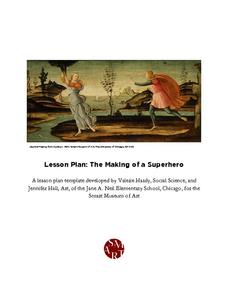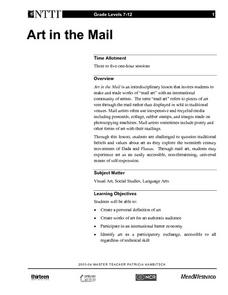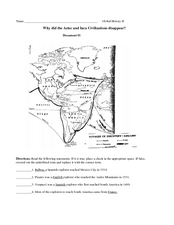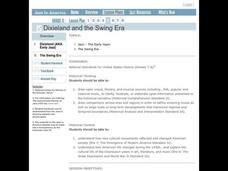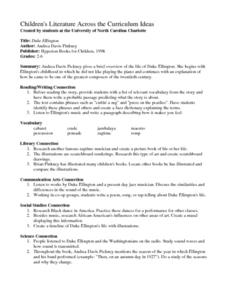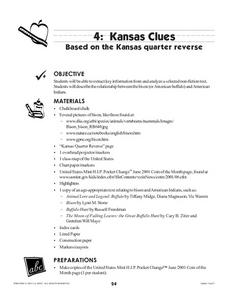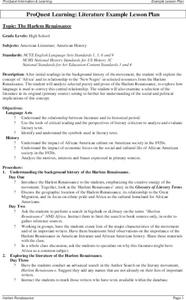Smart Museum of Art
The Making of a Superhero
Thor, Loki, Iron Man, and Captain America. As part of their study of Greek and Roman gods and heroes, middle schoolers compare the characters in The Avengers to Greek counterparts. Individuals then create their own superhero, describe...
Red River Press
Remembrance Day, Lest We Forget
Have we forgotten? As part of their study of Remembrance Day, class members consider whether countries have kept their promise not to forget and create their own remembrance ceremony.
Curated OER
Art in the Mail
The "mail art" phenomena was started back in the 20's with the Dada and Fluxus art movements and revitalized in the 60's. The principle of mail art, is free exchange and artistic expression. Learners study these facts and then create...
Curated OER
Objectivity
Help young readers examine historic artifacts to determine if they were designed to help people survive or to create enjoyment. They identify objects that were designed to help people to survive and to enjoy themselves. Then compare and...
Curated OER
Ancient Egypt
Pupils complete a series of activities to discover life in ancient Egypt. They create want ads for pyramid workers, design vocabulary flash cards and dictionaries, and research famous Egyptians. They also research the "Curse of the...
Curated OER
Arabic Folk and Popular Music: Egypt, Lebanon, and Spain
How many of us have actually listened to Arabic folk or pop music? Learn about the many facets of folk music common to Lebanon, Spain, and Egypt with this well-organized presentation. Islamic cultural influences are traced throughout...
Advocates for Human Rights
Who are Immigrants?
What do Jerry Yang, Patrick Ewing, John Muir, Charlize Theron, Peter Jennings, and Saint Frances X Cabrini all have in common? They are all immigrants to the United States. Famous and not-so-famous immigrants are the focus of a resource...
ReadWriteThink
Analyzing Famous Speeches as Arguments
A speaker, a message, an audience. After analyzing these elements in Queen Elizabeth's speech to the troops at Tilbury, groups analyze how other speakers use an awareness of events, and their audience to craft their arguments....
University of California
The Civil War: Final Assessment
Pupils discover the true nature and purpose of the Civil War in the eighth and final installment of an informative series. Using primary and secondary documents, history buffs merge social study knowledge with English skills to create a...
Curated OER
As the Kids Come and Go: Mapping a Classroom
Map the classroom with your kids to help them understand how maps work and how to read them. The lesson starts off with a story about animals living and moving around the globe, and then kids create maps of their classroom to show how...
Curated OER
Jazz in America
Students explore Bebop in America by listening to music and answering questions.
Curated OER
Jazz in America
Students learn where Jazz came from and why it is an important part of America's history.
Curated OER
Jazz in America
Students explore the Jazz of today and its future. They answer questions and listen to music.
Curated OER
Why did the Aztec and Inca civilizations disappear?
Middle schoolers can analyze primary source documents to answer the question, "Why did the Aztec and Inca civilizations disappear?" They will read the provided excerpts then answer 11 different questions to uncover the ultimate answer.
Curated OER
Jazz in America
Students explore Free Jazz and Fusion by answering questions and listening to music.
Curated OER
Jazz in America
Students explore jazz and its origins by focusing on the people in which Jazz came from.
Curated OER
Jazz in America
Students explore the Swing Era and its implications. They answer questions and listen to music from the era.
Curated OER
Children's Literature Across the Curriculum Ideas-Duke Ellington
Students read Duke Ellington by Andrea Davis Pinkney. They complete a variety of cross-curricular activities surrounding the life of the 20th century composer. Included are reading, art, math, science, writing, social studies, and...
Curated OER
Aristotle
For this online interactive history quiz worksheet, students respond to 51 multiple choice questions about the accomplishments of Aristotle. Students may submit their answers to be scored.
Curated OER
Literature: Isabel Allende
Students watch and respond to a Bill Moyers Now video on the Chilean author, Isabel Allende. They brainstorm a list of recent events that might inspire writers and choose one to write about in poetic, diary, or short story form.
Curated OER
Cemeteries Are Historical, Not Solely Grave
Students reflect on the value of graveyards as places of great historical importance and information. They create an epitaph for and a brief biography of a deceased historical figure whom they admire.
Curated OER
Kansas Clues
Students examine the Kansas state quarter and the Buffalo nickel and look for clue to help them identify why the bison was so important to the Native American. They perform "freeze frames" depicting Native American use of the bison.
Curated OER
The Harlem Renaissance
Students, after researching/analyzing the movement "Harlem Renaissance" and Africa as well as reading literature from that time period, create lists of the major characteristics of the movement and its important writers. They bridge the...
Curated OER
Learning About Location: Charting the Path of the George W. Elder
Students acquire a working knowledge of the geographical concepts: absolute location, relative location, longitude and latitude. They analyze primary sources that shows the physical and human characteristics of the places along the 1899...
Other popular searches
- Introduction to Poetry Terms
- Concrete Poetry Terms
- Teaching Poetry Terms
- Lyrics and Poetry Terms
- Poetry Terms Quiz
- Identifying Poetry Terms
- Poetry Literary Terms Rubric
- Poetry Terms and Examples
- Poetry Terms and Poems
- Poetry Terms Rubrics
- Literary Terms Poetry
- Poetry Terms Review'


